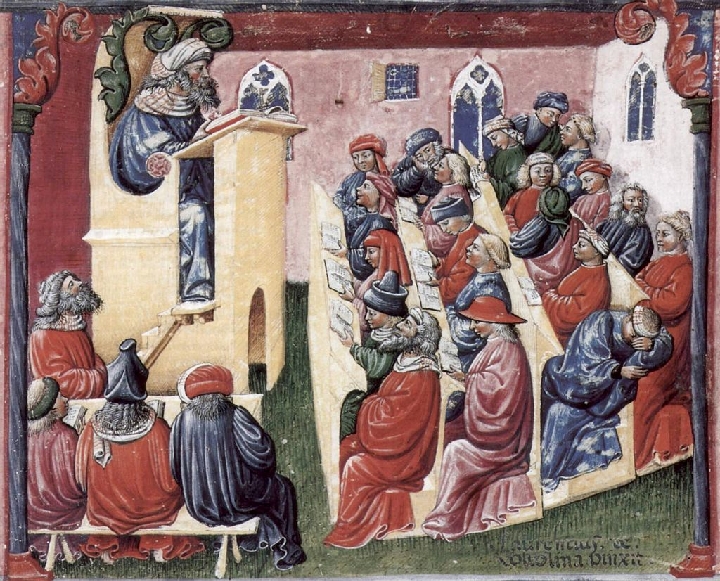Summer 2012
In Defense of Scholasticism
"Scholasticism” has long been a synonym for the worst kind of pedantry.
"Scholasticism” has long been a synonym for the worst kind of pedantry. “How many angels can dance on the head of a pin?” is the classic brush off directed toward this medieval school of thought. (It probably makes light of Catholic theologian Thomas Aquinas’s inquiries into the nature of angels in Summa Theologica.) But Rhodes College historian Alex J. Novikoff argues that Scholasticism and its formal debate technique, disputation, were crucial to the Western intellectual tradition.
One normally associates rhetorical rigor with the philosophers of ancient Greece, who hashed out their arguments in the agora, a public meeting ground. The discipline continued in Rome’s forums, but with the demise of the Roman Empire, dialogue moved inward, becoming a meditative practice. That changed in the 11th century with Anselm of Bec, an Italian-born monk who taught in a Norman monastery; he found himself drawn into using reasoned dialogues with his students as a method of instruction. The logic-heavy form of dialogue he pioneered became the “polemical genre of choice” for thinkers in the 12th century. Around the same time, renewed interest in Roman law, which used a question-and-answer approach to arrive at decisions, further whetted the scholarly appetite for dialectic study.
Medieval disputation truly flowered with the 12th-century rediscovery and translation of Aristotle’s Topics and Sophistical Refutations, which provided the best models yet for dialectic argumentation. Little was neglected in the effort to get to the truth. Disputation could occur before a scholarly audience, with one student arguing against a preannounced thesis, another dissecting his criticisms, and an instructor summing up the proceedings. It could be a private exercise between an instructor and his students. Or it could be conducted before the public, with the debaters taking on subjects de quolibet (“about anything at all”).
Sound familiar? It should—disputation is still central to Western higher education. The University of Paris made it a cornerstone of its pedagogy when it came to prominence in the 13th century, and the debate form “became an essential ingredient in the basic organization of academic learning,” Novikoff writes. The logic, rigor, and critical thought that became hallmarks of early modern Western intellectual culture can be traced to the medieval custom.
Disputation also made its influence felt in other realms, Novikoff argues. Polyphonic composition and the motet, both of which developed in 13th-century Paris, applied disputation’s use of point and counterpoint to music. John Locke (1632–1704) wrote that disputation was only good for employing the “ingenious and idle in intricate disputes about unintelligible terms, and holding them perpetually entangled in that endless labyrinth.” But the sharp-tongued English political philosopher probably owed the Scholastics more than he cared to admit.
THE SOURCE: “Toward a Cultural History of Scholastic Disputation” by Alex J. Novikoff. The American Historical Review, April 2012.
Photo courtesy of Wikimedia Commons
